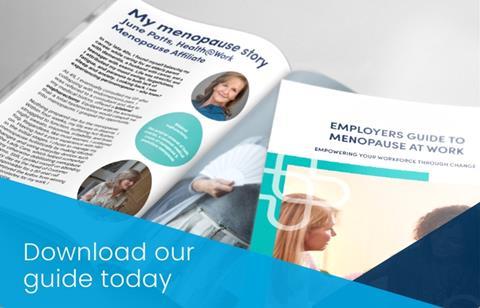
As the fastest growing employee demographic, there are more than 4.5 million women in the UK workforce aged between 50 and 64. As a result, menopause is swiftly becoming one of the most impactful health concerns faced by modern workplaces, as women and those assigned female at birth balance the mental and physical symptoms of menopause with their existing work pressures.
So, what makes menopause a workplace issue? Menopause has been found to have a potentially serious impact on an individual’s unique work experience – with the CIPD finding that as many as three in five menopausal women report their symptoms negatively impacting them at work. More worryingly, a lack of support for those experiencing menopausal symptoms has been linked to reduced progression into and retention of women in senior positions – a major aspect of the wage gap between genders.
The menopause impact
Menopause, and the period leading up to it (known as perimenopause), can manifest in a wide variety of different symptoms, both physical and mental. The most common of these include:
- Hot and cold flushes
- Joint stiffness
- Night sweats
- Difficulty sleeping
- Anxiety & low mood
- Irritability
- Memory problems & difficulty concentrating – often referred to as ‘brain fog’
Research by the Fawcett Society found that up to 70% of women find sleeplessness and brain fog as harder to manage than their physiological symptoms. These symptoms can be particularly impactful in the workplace, where they have been reported as effecting motivation, accuracy, and – crucially – self-confidence.
It’s important to remember, however, that menopause is an unavoidable part of life for half of our global population – meaning that better management and support for those experiencing a challenging menopause is vital to a more inclusive and sustainable wellbeing culture at work.
In addition to the wellbeing case, menopause is increasingly becoming a key business concern, as research by Peppy has found that the estimated cost of absence and lost productivity caused by unsupported menopause symptoms could be around £2.9 billion per year to the UK economy.
Supporting menopause in the workplace
When it comes to building an inclusive wellbeing programme that supports all employees experiencing menopause, it’s important to first establish a sense of psychological safety among your workforce. This means fostering an environment where employees can feel supported to raise concerns and ask for help without fear of being sidelined, labelled, or demoted due to their worries.
Once employees feel safe to raise any concerns, the two key elements of a menopause-positive workplace include open communication and conversations, and readily available accommodations. Some considerations that you may be able to implement to help employees manage the symptoms of menopause may include:
- Offering options for heating control such as heaters and fans
- Providing flexibility on work location and uniform guidance
- Providing accessible breakout areas for employees to stretch or rest
- Holding regular, empathetic check-ins with employees to ensure that meaningful support is being provided
Using benefits for menopause support
With increasing awareness of the importance of better support for menopause in the workplace, employee benefits are taking a more central role in providing this support. Health cash plans can be of particular use to those going through the menopause transition as the symptoms of menopause can mask, or be masked by, other health concerns, making regular treatment for everyday health worries an important step in symptom management.
Also of key importance to offering improved menopause support is the role of your Employee Assistance Programme, particularly those designed to offer proactive, individualised support to each user. For example, the Medicash EAP includes access to a specialist menopause helpline, where users can book a 1-2-1 appointment with the menopause support team for information, advice, and additional resources for consulting your GP about treatment and symptom management.
The importance of awareness & training
Finally, among the most important elements of a better approach to menopause support is increasing awareness and understanding among both managers and colleagues. By offering training for dedicated Menopause Champions, as well as hosting specialist awareness-raising sessions for both all genders and all levels of seniority, your workplace can boost its overall understanding of the unique challenges and experiences of menopause.
Workplace wellbeing consultancy Health@Work were among the first providers in the UK to offer a dedicated suite of menopause awareness training courses, and have released an ebook, The Employer’s Guide to Menopause at Work, which can be found here for more information and guidance.
With thousands of women and AFAB people opening up the discussions surrounding menopause at work, it’s now estimated that 9 in 10 UK businesses are looking to expand their menopause support structures within the next two years.
To find out more about how the Medicash Health & Wellbeing Group can support your employees through menopause and beyond, visit us at our website on www.medicash.org or call the team direct on 0800 195 2992.




